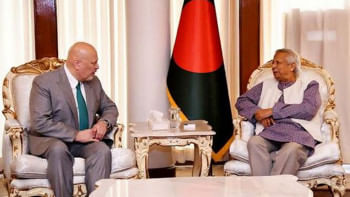Ratings a must for banks

Eastern Bank Ltd has paved the path forward once again, becoming the first company in the country to be ranked by Moody's Investors Service this year.
EBL has shown its willingness to be transparent by exposing its accounts to the globally reputed auditors at a time when many Bangladeshi financial institutions are plagued by bad loans, scams and poor governance.
The rating, which is an evaluation of the credit risk of a bank, predicts its ability to pay back debt, according to Ali Reza Iftekhar, the bank's managing director and chief executive.
“The rating will help us save costs,” said Iftekhar, in an interview with The Daily Star at his office. “We can now bargain with bilateral and multilateral sources from whom we borrow in foreign currencies.”
The rating will also improve the bank's image, reputation and visibility, both domestically and internationally, and help investors in the capital markets take more insightful decisions as far as the underlying credit risk is concerned.
Iftekhar believes all banks, except the nine fourth generation banks, should go for obtaining the international credit rating for the sake of their business and the credibility for future growth. The new banks need more time before being rated by the international agencies.
But current trends are still bleak as only one financial institution -- The City Bank -- has been rated after EBL. In fact, Bangladesh Bank, the country's central bank, first showed the way seven years ago when it moved to get the sovereign rating by Moody's, Standard & Poor's and Fitch.
Moody's assigned the Ba3 credit rating with a stable outlook for EBL, equivalent to that of the Bangladesh's sovereign rating it affirmed last time.
The Ba3 long-term ratings assigned to EBL incorporate its BCA (baseline credit assessment) of B1 and one notch uplift to reflect Moody's assumption of moderate systemic support to the bank in case of stress. However, its foreign currency deposit rating remains positioned at B1 because Bangladesh's foreign currency deposit ceiling is capped at that level.
Moody's affirmed that the bank's key credit strengths comprise its profitability profile, strong balance sheet buffers and record of good asset quality. Data also shows that the bank did not give dividends less than 20 percent at a row in the last 12 years. Last year, it gave 35 percent dividend, the highest among all banks.
The bank's asset quality has consistently been better than its peer banks, as measured by gross non-performing loans (NPLs). At the end of 2015, the bank's NPL stood at 3.19 percent, which was a third of the industry's average and nearly half the average NPL of 39 private banks.
The bank's reported core Tier 1 ratio, which is a comparison between a banking firm's core equity capital and its total risk-weighted assets, was at 10.2 percent at the end of 2014, and its loan loss coverage stood at 109 percent on September 30, 2015.
Moody's said the bank should be able to maintain its Tier 1 ratio at current levels, because it can support loan growth with retained earnings. However, it said the management's aim of maintaining a high pay-out ratio could limit improvements to the Tier 1 ratio.
But EBL's path to success did not come so easily. Its success was full of struggle, since its inception in 1992, from the ashes of the then collapsed BCCI (Bank of Credit and Commerce International). The bank was restructured as per the guidelines of the central bank and some depositors of the BCCI got shares in the new bank and became directors.
“EBL began its journey with Tk 365 crore in negative capital. The directors did not take any dividends and fees until it made profits after six years,” said Iftekhar, who joined the bank in 2004 as a deputy managing director and assumed the office of the managing director and CEO in 2007.
He said 24 years of step-by-step growth has made EBL one of the most valuable financial institutions in the country. The bank also deserves credit for taking many revolutionary steps in Bangladesh.
EBL is the first bank in Bangladesh to go online; it provided the first 'green loan' to a solar panel manufacturing plant, which will contribute to transforming the lives of 10 lakh people in remote and off-grid areas; it is the first local bank to finance the aircraft purchase deal of state-owned Biman Bangladesh Airlines. Prior to this, only multinational banks used to finance such projects.
Unlike many of the 47 local banks, EBL is not undertaking mass banking. In its 24-year journey, the bank has built a network of only 81 branches, but its asset size stands at nearly Tk 15,000 crore, higher than many of its peers.
Of the bank's total revenue in 2015, 67 percent came from corporate banking, followed by 14 percent from small and medium enterprises and 13 percent from retail.
Iftekhar said Bangladesh has a huge potential to grow, but infrastructure and energy constraints still pose the biggest challenge. To him, political turmoil does not pose a big threat anymore.
He also criticised people who favour controlling inflation at the cost of development.
Iftekhar came down heavily on the wilful defaulters, who spend lavish lives without paying off their bank loans. Though his bank's bad loans are much lower than many other banks, he is serious about recovering those loans. In addition to outsourcing companies, he has engaged more than 150 employees of the bank to recover default loans, which push up the cost of doing business.


 For all latest news, follow The Daily Star's Google News channel.
For all latest news, follow The Daily Star's Google News channel. 



Comments